Dibyajyoti Sarma's Blog, page 36
July 14, 2015
লুইতত ভোটোঙাই ওলাল শিহু by Bhupen Hazarika
লুইতত ভোটোঙাই ওলাল শিহু
আজি বোলে ৰঙালী বিহু বিহু
যেন লেতেকুৰে থোক
এ' দলদোপ দলদোপ হেন্দোলদোপ
ধেমালি চাই যা ধেমালি চা।
সমাজৰ পথাৰত কোন খেলুৱৈয়ে
কাক বা সাজিছে ঢোপ
ৰাইজৰ এইগাল লোক
দলদোপ দলদোপ হেন্দোলদোপ
ধেমালি চাই যা, ধেমালি চা।
এ' ইফালেদি লথিয়ায়-- ৰংমন-ভদীয়াক
সিফালেদি লথিয়ায় তোক
নাজিতৰা, ইফালেদি লথিয়ায় তোক
ৰঙালী বিহুটিক কঙালী কৰিলে
পোটৰো নুগুচে ভোক
নাজিতৰা, পেটৰো নুগুচে ভোক
এহ দুদিন বিহু কৰি এবছৰ কান্দিবি
গিলিবি দুখৰহে ঢোক
এ' ৰাইজৰ এইগাল লোক
এ' দলদোপ দলদোপ হেন্দোলদোপ
ধেমালি চাই য়া, ধেমালি চা।
এ' বিহু কাপোৰ বিচাৰি খালো হাবাথুৰি
সূতাও মহঙা হ'ল ঐ গোৱিন্দাই ৰাম
হুৰৰ বৰ বৰ দেউতাৰ পদূলি সাঁৰোতে
ককাল মোৰ ভাগিয়ে গ'ল ঐ গোৱিন্দাই ৰাম
চাওঁতে চাওঁতে গ'লবাৰ বিহুতে
গৰুহাল বন্ধকীত গ'ল ঐ গোবিন্দাই ৰাম
কোনোবা সমুদ্ৰত বোমা ফুটুৱালে
ক'ৰবাত পৰিলে ছাঁই
এগণ্ডা বোমাৰে পৃথিৱী পুৰিব
ক'ৰবাৰ ৰণ বলিয়াই
উদজান বোমাৰে গুণগান বখানি
ন'কবি ভণী তই মোক
বোলো ৰণ হ'লে খাম কি
ৰণ হ'লে গাম কি
মৰিব দেশৰহে লোক
শান্তিৰে নিঃজৰাত নিজৰি নঃ নগলে
আমি হ'ম বৰশীৰে টোপ
অতিকৈনো চেঃ চেনেহৰ বহাগৰনো বিঃ বিহুটিৰ
সুৰটিনো পাবগৈ লোপ
ৰাইজৰ এইগাল লোক
দলদোপ দলদোপ হেন্দোলদোপ
ধেমালি চাইযা ধেমালি চা
বোৱতী সূতিটিক ভেটিবযে নোৱাৰি অ' আইতা
ভেটা ভাঙে ঘনে ঘনে
দেশৰে ৰাইজে অ' আইতা কঢ়িয়াই লৈ যোৱা
অ' আইতা সময়ক ভেটিব কোনে ...
Published on July 14, 2015 00:19
July 13, 2015
The Hotel New Hampshire
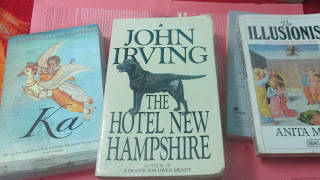 Perhaps John Irving will now calm down and return to his typewriter. He has, in recent weeks, told so many readers of so many magazines so much about himself and the various meanings of his new novel and why the reviewers aren't going to like it or him that the book itself - quite a good one, incidentally - all but snores under a pile of symbolic spinach. Mr. Irving, like a Nabokov in jogging shorts, commits pre-emptive criticism.
Perhaps John Irving will now calm down and return to his typewriter. He has, in recent weeks, told so many readers of so many magazines so much about himself and the various meanings of his new novel and why the reviewers aren't going to like it or him that the book itself - quite a good one, incidentally - all but snores under a pile of symbolic spinach. Mr. Irving, like a Nabokov in jogging shorts, commits pre-emptive criticism.We are told that even a child can understand ''The Hotel New Hampshire,'' and that critics will resent this because they prefer unintelligibility; that the novel is a fable and will therefore disappoint the low American appetite for realism; that the three hotels - in New Hampshire, in Vienna and on the coast of Maine - represent childhood, adolescence and responsible maturity; and that Mr. Irving has been influenced by everybody from Donizetti to Turgenev to Freud to Carl E. Schorske.
Tireless Explainers
As if that weren't already enough advice, the characters in ''The Hotel New Hampshire'' are tireless explainers. ''Everything is a fairy tale,'' says Lilly. ''There are no happy endings,'' says Father. ''You've got to get obsessed and stay obsessed,'' says Iowa Bob. ''Happy fatalism,'' says Frank. ''If Father could have bought another bear,'' says John, ''he wouldn't have had to buy a hotel.'' ''What?'' says Egg. ''Keep passing the open windows,'' they remind themselves and each other.
''Keep passing the open windows'' is repeated over and over again, and it is excellent advice, especially if, like the Berry Family, you spend most of your time in hotels. Stop at a window and you may jump out. The Berry family is on intimate terms with violent death. ''Sorrow floats'' is also repeated, far too often. Sorrow, in this case, is a stuffed dog; love and doom likewise float. ''Thus the family maxim was that an unhappy ending did not undermine a rich and energetic life.''
Of course, there is a rape. This wouldn't be a John Irving novel without a rape or a bear or Vienna or body-building or social privilege. There are, in fact, two rapes and two bears, as there are two Freuds and two blind men and two faces to the stuffed Sorrow. ''Retrieving Sorrow is a kind of religion, too,'' we are told. A child I asked didn't understand that sentence.
Win and Mary Berry, in the summer of 1939, buy a motorcycle and a performing bear from a man named Freud. When the bear dies, they buy an abandoned girls' school and turn it into a hotel. When the hotel fails, they sell it to a circus and fly the whole family off to postwar Vienna, where this same Freud, the wrong Freud, has another hotel, occupied by prostitutes and implausible terrorists. When the terrorists fail to blow up the Vienna State Opera, the Berry famliy, what's left of it, comes home. Two are dead, one is blind, one has been raped, one is homosexual and one will commit suicide. Their third and final hotel is a rape crisis center.
I haven't mentioned the Black Arm of the Law, the King of Mice, Chipper Dove, lesbianism, incest, schlagobers or ''The Great Gatsby.'' Win Berry, the father, is a reincarnation of Gatsby, a dangerous dreamer whose ''pure love'' is for the future, whose ''imagination was his own hotel.'' In seeking to protect his children, he exposes them to a series of terrifying accidents, pure lethal chance, the arbitrariness that is our contemporary substitute for evil. Gatsby is America, denying history, trapped in the receding future. He is also a figure of death, the man in the white dinner jacket, the last stupid romantic, a bewildered guest in his own bleak house.
More Here/
Published on July 13, 2015 04:44
July 10, 2015
The War of Don Emmanuel's Nether Parts
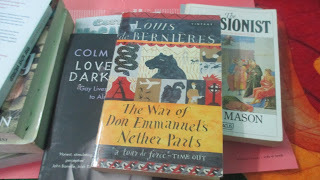 The War of Don Emmanuel's Nether Parts is a novel by Louis de Bernières, first published in 1990. It is the first of his Latin American trilogy. The other two parts are Señor Vivo and the Coca Lord and The Troublesome Offspring of Cardinal Guzman.
The War of Don Emmanuel's Nether Parts is a novel by Louis de Bernières, first published in 1990. It is the first of his Latin American trilogy. The other two parts are Señor Vivo and the Coca Lord and The Troublesome Offspring of Cardinal Guzman.It is de Bernières' first published novel, but is an accomplished and complex work. His recognition of evil is combined with sympathy for those characters trapped in evil patterns of behaviour, a characteristic of his later work which is perhaps more pronounced in this early work than in his greatest hit Captain Corelli's Mandolin.
More here/
Published on July 10, 2015 05:50
Beautiful Losers
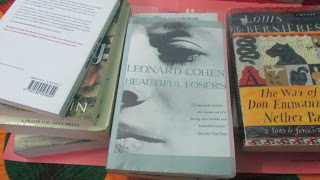 Leonard Norman Cohen, CC GOQ (born 21 September 1934) is a Canadian singer, songwriter, musician, poet, and novelist. His work has explored religion, politics, isolation, sexuality, and personal relationships. Cohen has been inducted into both the Canadian Music Hall of Fame and the Canadian Songwriters Hall of Fame as well as the American Rock and Roll Hall of Fame. He is also a Companion of the Order of Canada, the nation's highest civilian honor. In 2011, Cohen received a Princess of Asturias Awards for literature.
Leonard Norman Cohen, CC GOQ (born 21 September 1934) is a Canadian singer, songwriter, musician, poet, and novelist. His work has explored religion, politics, isolation, sexuality, and personal relationships. Cohen has been inducted into both the Canadian Music Hall of Fame and the Canadian Songwriters Hall of Fame as well as the American Rock and Roll Hall of Fame. He is also a Companion of the Order of Canada, the nation's highest civilian honor. In 2011, Cohen received a Princess of Asturias Awards for literature.The critic Bruce Eder assessed Cohen's overall career in popular music by asserting that "[he is] one of the most fascinating and enigmatic … singer/songwriters of the late '60s … [and] has retained an audience across four decades of music-making.... Second only to Bob Dylan (and perhaps Paul Simon) [in terms of influence], he commands the attention of critics and younger musicians more firmly than any other musical figure from the 1960s who is still working at the outset of the 21st century."
One of his notable novels, Beautiful Losers (1966) received attention from the Canadian press and was considered controversial because of a number of sexually graphic passages. The Academy of American Poets has commented more broadly on Cohen's overall career in the arts, including his work as a poet, novelist, and songwriter, stating that "Cohen's successful blending of poetry, fiction, and music is made most clear in Stranger Music: Selected Poems and Songs, published in 1993, which gathered more than 200 of Cohen's poems … several novel excerpts, and almost 60 song lyrics... While it may seem to some that Leonard Cohen departed from the literary in pursuit of the musical, his fans continue to embrace him as a Renaissance man who straddles the elusive artistic borderlines."
Cohen's first album was Songs of Leonard Cohen (1967) followed by Songs from a Room (1969) (featuring the often-recorded "Bird on the Wire") and Songs of Love and Hate (1971). His 1977 record Death of a Ladies' Man was co-written and produced by Phil Spector, which was a move away from Cohen's previous minimalist sound. In 1979 Cohen returned with the more traditional Recent Songs, which blended his acoustic style with jazz and Oriental and Mediterranean influences. "Hallelujah" was first released on Cohen's studio album Various Positions in 1984. I'm Your Man in 1988 marked Cohen's turn to synthesized productions and remains his most popular album. In 1992 Cohen released its follow-up, The Future, which had dark lyrics and references to political and social unrest. Cohen returned to music in 2001 with the release of Ten New Songs, which was a major hit in Canada and Europe. In 2006 Cohen produced and co-wrote Blue Alert, a collaboration with jazz chanteuse Anjani Thomas. After the success of his 2008–13 world tours, Cohen released the highest charting album in his entire career, Old Ideas, to positive reviews. On 22 September 2014, one day after his 80th birthday, Cohen released his 13th studio album, Popular Problems, again to positive reviews.
More Here/
/
Beautiful Losers is the second novel by Canadian writer and musician Leonard Cohen. It was published in 1966, before he began his career as a singer-songwriter, and Cohen has yet to publish another.
Set in the Canadian province of Quebec, the story of 17th-century Mohawk saint Kateri Tekakwitha is interwoven with a love triangle between an unnamed anglophone Canadian folklorist; his Native wife, Edith, who has committed suicide; and his best friend, the mystical F, a Member of Parliament and a leader in the Quebec separatist movement. The complex novel makes use of a vast range of literary techniques, and a wealth of allusion, imagery, and symbolism. It is filled with the mysticism, radicalism, sexuality, and drug-taking emblematic of the 1960s era, and is noted for its linguistic, technical, and sexual excesses.
Cohen wrote the novel in two eight-month spurts while living on the Greek island of Hydra in 1964 and 1965. He fasted and consumed amphetamines to focus his creativity on the novel. Despite a lavish rollout, sales were disappointing, and critics were initially unsympathetic or hostile. The book gained critical and commercial attention only after Cohen had given up novel-writing and turned to the songwriting and performing upon which his fame rests today. Beautiful Losers has come to be seen as having introduced postmodernism into Canadian literature. It has become a steady seller, and is considered a part of the Canadian literary canon.
More Here/
Published on July 10, 2015 05:13
The Heart of a Woman
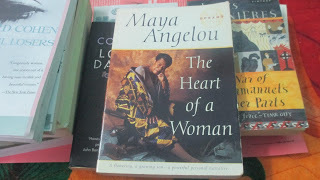 Maya Angelou (ˈmaɪ.ə ˈændʒəloʊ/;born Marguerite Annie Johnson; April 4, 1928 – May 28, 2014) was an American author, poet, dancer, actress, and singer. She published seven autobiographies, three books of essays, and several books of poetry, and was credited with a list of plays, movies, and television shows spanning over 50 years. She received dozens of awards and more than 50 honorary degrees. Angelou is best known for her series of seven autobiographies, which focus on her childhood and early adult experiences. The first, I Know Why the Caged Bird Sings (1969), tells of her life up to the age of 17 and brought her international recognition and acclaim.
Maya Angelou (ˈmaɪ.ə ˈændʒəloʊ/;born Marguerite Annie Johnson; April 4, 1928 – May 28, 2014) was an American author, poet, dancer, actress, and singer. She published seven autobiographies, three books of essays, and several books of poetry, and was credited with a list of plays, movies, and television shows spanning over 50 years. She received dozens of awards and more than 50 honorary degrees. Angelou is best known for her series of seven autobiographies, which focus on her childhood and early adult experiences. The first, I Know Why the Caged Bird Sings (1969), tells of her life up to the age of 17 and brought her international recognition and acclaim.She became a poet and writer after a series of occupations as a young adult, including fry cook, prostitute, nightclub dancer and performer, cast member of the opera Porgy and Bess, coordinator for the Southern Christian Leadership Conference, and journalist in Egypt and Ghana during the decolonization of Africa. She was an actor, writer, director, and producer of plays, movies, and public television programs. In 1982, she earned the first lifetime Reynolds Professorship of American Studies at Wake Forest University in Winston-Salem, North Carolina. She was active in the Civil Rights movement, and worked with Martin Luther King, Jr. and Malcolm X. Beginning in the 1990s, she made around 80 appearances a year on the lecture circuit, something she continued into her eighties. In 1993, Angelou recited her poem "On the Pulse of Morning" (1993) at President Bill Clinton's inauguration, making her the first poet to make an inaugural recitation since Robert Frost at President John F. Kennedy's inauguration in 1961.
With the publication of I Know Why the Caged Bird Sings, Angelou publicly discussed aspects of her personal life. She was respected as a spokesperson for black people and women, and her works have been considered a defense of Black culture. Attempts have been made to ban her books from some U.S. libraries, but her works are widely used in schools and universities worldwide. Angelou's major works have been labeled as autobiographical fiction, but many critics have characterized them as autobiographies. She made a deliberate attempt to challenge the common structure of the autobiography by critiquing, changing, and expanding the genre. Her books center on themes such as racism, identity, family, and travel.
More here/
Published on July 10, 2015 04:44
Outlander
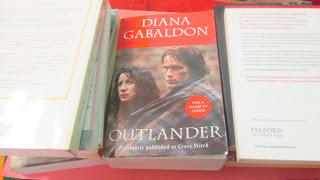 Outlander (published in the United Kingdom as Cross Stitch) is the first in a series of eight historical multi-genre novels by Diana Gabaldon. Published in 1991, it focuses on 20th century nurse Claire Randall, who time travels to 18th century Scotland and finds adventure and romance with the dashing James Fraser. A mix of several genres, the Outlander series features elements of historical fiction, romance, adventure and science fiction/fantasy. Outlander won the Romance Writers of America's RITA Award for Best Romance of 1991. A television adaptation of the Outlander series premiered on Starz in the US on August 9, 2014.
Outlander (published in the United Kingdom as Cross Stitch) is the first in a series of eight historical multi-genre novels by Diana Gabaldon. Published in 1991, it focuses on 20th century nurse Claire Randall, who time travels to 18th century Scotland and finds adventure and romance with the dashing James Fraser. A mix of several genres, the Outlander series features elements of historical fiction, romance, adventure and science fiction/fantasy. Outlander won the Romance Writers of America's RITA Award for Best Romance of 1991. A television adaptation of the Outlander series premiered on Starz in the US on August 9, 2014.More here/
Published on July 10, 2015 04:31
July 8, 2015
The Giver
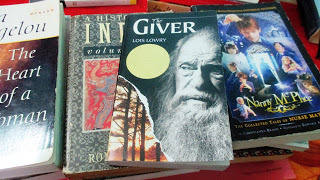 The Giver is a 1993 American Young-adult fiction-Dystopian novel by Lois Lowry. It is set in a society which at first appears as a utopian society but then later revealed to be a dystopian one as the story progresses. The novel follows a boy named Jonas through the twelfth and thirteenth years of his life. The society has eliminated pain and strife by converting to "Sameness," a plan that has also eradicated emotional depth from their lives. Jonas is selected to inherit the position of Receiver of Memory, the person who stores all the past memories of the time before Sameness, as there may be times where one must draw upon the wisdom gained from history to aid the community's decision making. Jonas struggles with concepts of all of the new emotions, and things being introduced to him, and whether they are inherently good, evil, in-between, and if it's even possible to have one without the other. The Community lacks any color, memory, climate and terrain whatsoever, all in effort to preserve structure, order, and a true sense of equality beyond personal individuality.
The Giver is a 1993 American Young-adult fiction-Dystopian novel by Lois Lowry. It is set in a society which at first appears as a utopian society but then later revealed to be a dystopian one as the story progresses. The novel follows a boy named Jonas through the twelfth and thirteenth years of his life. The society has eliminated pain and strife by converting to "Sameness," a plan that has also eradicated emotional depth from their lives. Jonas is selected to inherit the position of Receiver of Memory, the person who stores all the past memories of the time before Sameness, as there may be times where one must draw upon the wisdom gained from history to aid the community's decision making. Jonas struggles with concepts of all of the new emotions, and things being introduced to him, and whether they are inherently good, evil, in-between, and if it's even possible to have one without the other. The Community lacks any color, memory, climate and terrain whatsoever, all in effort to preserve structure, order, and a true sense of equality beyond personal individuality.The Giver won the 1994 Newbery Medal and has sold more than 10 million copies. In Australia, Canada, and the United States, it is a part of many middle school reading lists, but it is also on many challenged book lists and appeared on the American Library Association's list of most challenged books of the 1990s.
In 2014, the film adaptation was released, starring Jeff Bridges, Meryl Streep and Brenton Thwaites.
The novel forms a loose quartet[3] with three other books set in the same future era: Gathering Blue (2000), Messenger (2004), and Son (2012).
Published on July 08, 2015 05:37
July 7, 2015
Your HandBy Paul CelanYour hand full of hours, you came t...
Your Hand
By Paul Celan
Your hand full of hours, you came to me – and I said:
‘Your hair is not brown.’
You lifted it, lightly,
on to the balance of grief,
it was heavier than I.
They come to you on their ships, and make it their load,
then put it on sale in the markets of lust.
You smile at me from the deep.
I weep at you from the scale that’s still light.
I weep: Your hair is not brown.
They offer salt-waves of the sea,
and you give them spume.
You whisper: ‘They’re filling the world with me now,
and for you I’m still a hollow way in the heart!
You say: ‘Lay the leaf-work of years by you, it’s time,
that you came here and kissed me.
The leaf-work of years is brown, your hair is not brown.
More here.
/
Paul Celan (/ˈsɛlæn/;[1] 23 November 1920 – c. 20 April 1970) was a German language poet and translator. He was born as Paul Antschel to a Jewish family in Cernăuți (German: Czernowitz), in the then Kingdom of Romania (now Chernivtsy, Ukraine), and adopted the pseudonym "Paul Celan". (Celan in Romanian is pronounced Chelàn, and was derived from transposing the syllables of his surname). He became one of the major German-language poets of the post-World War II era.
More here/
By Paul Celan
Your hand full of hours, you came to me – and I said:
‘Your hair is not brown.’
You lifted it, lightly,
on to the balance of grief,
it was heavier than I.
They come to you on their ships, and make it their load,
then put it on sale in the markets of lust.
You smile at me from the deep.
I weep at you from the scale that’s still light.
I weep: Your hair is not brown.
They offer salt-waves of the sea,
and you give them spume.
You whisper: ‘They’re filling the world with me now,
and for you I’m still a hollow way in the heart!
You say: ‘Lay the leaf-work of years by you, it’s time,
that you came here and kissed me.
The leaf-work of years is brown, your hair is not brown.
More here.
/
Paul Celan (/ˈsɛlæn/;[1] 23 November 1920 – c. 20 April 1970) was a German language poet and translator. He was born as Paul Antschel to a Jewish family in Cernăuți (German: Czernowitz), in the then Kingdom of Romania (now Chernivtsy, Ukraine), and adopted the pseudonym "Paul Celan". (Celan in Romanian is pronounced Chelàn, and was derived from transposing the syllables of his surname). He became one of the major German-language poets of the post-World War II era.
More here/
Published on July 07, 2015 00:35
The Lost World
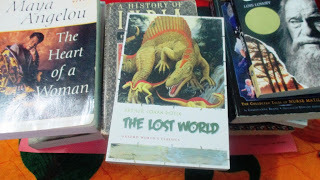 The Lost World is a novel released in 1912 by Sir Arthur Conan Doyle concerning an expedition to a plateau in the Amazon basin of South America where prehistoric animals (dinosaurs and other extinct creatures) still survive. It was originally published serially in the popular Strand Magazine and illustrated by New-Zealand-born artist Harry Rountree during the months of April–November 1912. The character of Professor Challenger was introduced in this book. The novel also describes a war between indigenous people and a vicious tribe of ape-like creatures.
The Lost World is a novel released in 1912 by Sir Arthur Conan Doyle concerning an expedition to a plateau in the Amazon basin of South America where prehistoric animals (dinosaurs and other extinct creatures) still survive. It was originally published serially in the popular Strand Magazine and illustrated by New-Zealand-born artist Harry Rountree during the months of April–November 1912. The character of Professor Challenger was introduced in this book. The novel also describes a war between indigenous people and a vicious tribe of ape-like creatures./
In 1915, the Russian scientist Vladimir Obruchev produced his own version of the "lost world" theme in the novel Plutonia, which places the dinosaurs and other Jurassic species in a fictional space inside the hollow Earth connected to the surface via an opening in the Russian Far North.
In 1916, Edgar Rice Burroughs published The Land That Time Forgot, his version of The Lost World where lost submariners from a German U-Boat discovered their own lost world of dinosaurs and ape-men in Antarctica. Two other books in the series followed.
Author Greg Bear set his 1998 novel Dinosaur Summer in Conan Doyle's Lost World.
A 1994 release for the Forgotten Futures role-playing game was based on and includes the full text of the Professor Challenger novels and stories.
Conan Doyle's title was reused by Michael Crichton in his 1995 novel The Lost World, a sequel to Jurassic Park. (Its film adaptation, The Lost World: Jurassic Park, followed suit.) Both the book and its movie adaptation share a somewhat similar setting with the Conan Doyle story, involving a journey to an isolated area filled with living dinosaurs. At least two similarly named TV shows, Land of the Lost and Lost, nod to this source material, although the latter draws more from Doyle's short story "The Lost Special". At least two of the characters in Michael Crichton's novel The Lost World mention a palaeontologist called John Roxton. However, Crichton's Roxton, who is never seen, is something of an idiot, wrongly identifying one dinosaur and publishing a report stating that the braincase of Tyrannosaurus rex is the same as that of a frog and thus possesses a visual system attuned strictly to movement.
More here/
Published on July 07, 2015 00:29
Chinaman
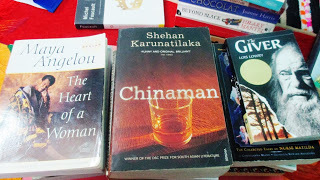 It does seem as though the serious cricket novel is beginning to become a valid fictional sub-genre. You have Joseph O'Neill's Netherland, 24 for 3 by "Jennie Walker" (ie Charles Boyle) and now this.
It does seem as though the serious cricket novel is beginning to become a valid fictional sub-genre. You have Joseph O'Neill's Netherland, 24 for 3 by "Jennie Walker" (ie Charles Boyle) and now this.For some readers the words "serious cricket novel" are off-putting. But cricket novels, or rather their creators, know this, and assume in the reader a position of ignorance, or perhaps even of hostility, to the game. Early on, our narrator writes: "If you've never seen a cricket match; if you have and it has made you snore; if you can't understand why anyone would watch, let alone obsess over this dull game, then this is the book for you." Let us take this sales pitch – as it is so described – at face value (but not with an entirely straight face).
A "Chinaman" in cricket is a particular delivery, a slower ball designed to fool the batsman into thinking it will bounce in the opposite direction to the one it does. It also, in Sri Lankan argot, is a term indicating gullibility. Likewise, the novel has two poles, and twists enough to wrong-foot the reader. On one level, it is the self-narrated account of a dying cricket journalist's attempt to make a documentary, and write a book, about Pradeep Mathew, who during the 1980s was Sri Lanka's most devastating and talented spin bowler, but who has mysteriously disappeared not only from the country but from the historical record; he may very well be dead.
On another level, or rather inconspicuously yet ominously trundling alongside this narrative, it is the story of Sri Lanka in the late 20th century: a country torn apart by terrorism and corruption, where old-boy networks are key, and where you can be killed horribly if you are in the wrong place at the wrong time: "The men with clubs and knives stormed the bus and asked passengers to speak Sinhala, to say words that Tamils found difficult to pronounce, like baaldiya. Irangani and Sabi passed the test, an elderly gentleman in front did not. He was dragged out and set on fire."
The voice Karunatilaka has chosen to tell this story belongs to WG Karunasena, who takes great pride in his first two initials, and who has named his son Garfield, after Gary Sobers, perhaps the greatest all-rounder the game has ever seen. However, Garfield Karunasena is, for most of the book, a bit of a drop-out: a dope-smoking bass player with no interest in cricket at all. His father's career is down the pan, and he has decided to drink himself to death. But at least before he does so he hopes to find out what has happened to Pradeep Mathew, half-Sinhalese, half-Tamil, possessed of such outrageous gifts that he is able to mimic the style of any bowler he sees – even being able to bowl equally well with either his left or his right hand. He also has in his armoury the double-bounce ball, which in the real world is a sign of shameful, hilarious ineptitude, but in this book is an unplayable delivery, the ball behaving "like a pebble skimming water".
More Here/
Published on July 07, 2015 00:26



